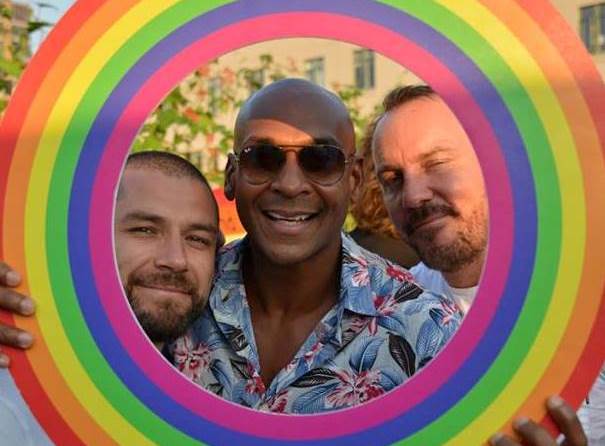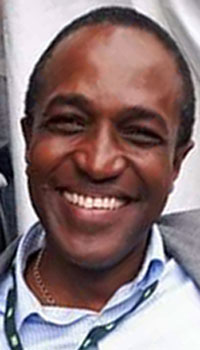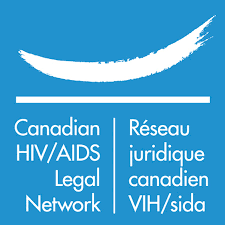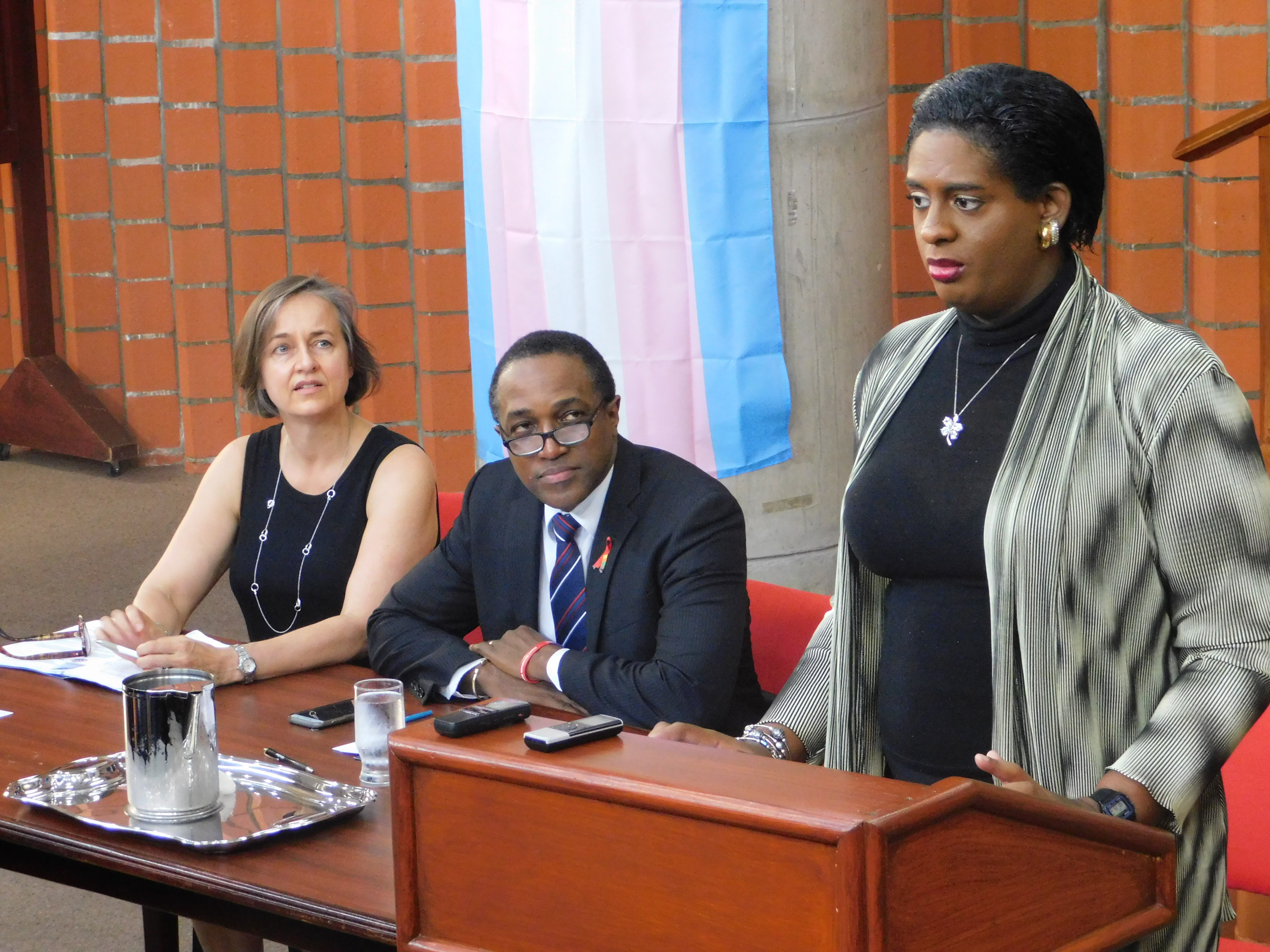Goal of diaspora fund drive: LGBTQI rights in the Caribbean
Maurice Tomlinson of Jamaica and Canada has been involved in…
The new Caribbean Can Rainbow Fund has been established to allow members of the Caribbean diaspora community and concerned allies to contribute to the effort to safeguard the rights of LGBTQI people in the region. Jamaican/Canadian activist Maurice Tomlinson explains.

In 2012 I was forced to flee my native Jamaica for my husband’s country of Canada. This occurred because a Jamaican newspaper published an unauthorized photo of our same-sex wedding on their front page with the caption: “Jamaican Gay Activist Marries Man in Canada” and I immediately started receiving a flood of vicious death threats.
I was teaching law at a local university at that time and one of my students proceeded to post my teaching schedule and a description of the car that I drove as a comment to the online article.
I was devastated and felt both betrayed and scared. I thought that I could not return to teach at that university for the upcoming semester because my safety was so compromised. I had no faith in Jamaican police, which had previously ignored my other requests for help in investigating death threats associated with my activism for LGBT human rights on the island.

Although most of my students had probably suspected that I was gay, I never confirmed their suspicions because, among other things, Jamaica criminalizes all forms of male-sex intimacy with a maximum sentence of ten years at hard labour. And once released convicted persons would be required to register as sex offenders and always carry a pass or face a JA$1Million (about US$9,000) fine PLUS up to a year imprisonment for each offence of not having their pass. My same-sex marriage had also been recently banned because of a constitutional amendment sponsored by fear-mongering right-wing Christian extremists. These included a Canadian law lecturer who testified before Jamaica’s Parliament about the supposed “threat” that same-sex marriage posed to society, based on the experience of marriage-equality in Canada.
I was devastated at having to leave my job teaching law, which I thoroughly enjoyed. And more so because I though that by fleeing I had let the homophobic bigots win. I was also teaching discrimination law to the President of Jamaica’s Senate and I wanted to ensure that at least one of our senior politicians knew the truth about discrimination faced by the country’s LGBT community. So, after a month’s absence, I decided to fly to Jamaica every week from Toronto to continue teaching my courses for the rest of the semester. My husband strenuously objected, but as a former Toronto Police officer he helped me devise a security protocol, which resulted in me being largely a prisoner while I was in the island.
At the end of the semester I relocated permanently to Canada and I was soon employed to teach law at another university. At that institution I had none of the restrictions that plagued me in Jamaica about expressing my sexuality or discussing my husband, who also taught at the university. And I reveled in this new sense of freedom.
However, soon after I begun teaching I noticed a student (who I soon discovered was originally from Trinidad) staring sternly at me in class. He rarely smiled, and I thought that he was offended by my open discussions of my sexuality. Up until April of this year Trinidad was one of the last remaining countries in the western hemisphere that criminalized same-sex intimacy and anti-gay religious sentiment was popular among Trinidadians. But I was not deterred by this student’s stares because I knew that in Canada I was at least legally protected from harassment. So, a repeat of the sense of dread brought on by the betrayal of my Jamaican student was unlikely.
It turns out that I could not have been more wrong about this Trinidadian-Canadian student. At the end of the semester he handed me a note confiding that he was himself gay, and that I was the first gay black teacher that he had encountered. He said that he was also inspired to come out to his family and friends because of my example.
I was left speechless and humbled by his disclosure and we eventually became Facebook friends.
I am quite prolific on Facebook, but he rarely comments. However, he recently sent me another note that was again very moving. It is shared below:
Hi Maurice. I hope that you and Professor Decker [my husband] are doing well. Just wanted to give you a quick reminder that people all over the world are inspired by the work that you do. When it gets difficult, and I’m sure it does, remember that you offer enough light to lead many of us out of the darkness. I didn’t come out till I was 30. Conservative Baptist family and straight homophobic friends made it very difficult for me. I felt like I would be alone in the world if I did. When I walked into the first class that I had the privilege of being taught by you in my first year of university I saw someone that I wanted to be like. A strong, well educated, well spoken, funny, gay black man. You gave me that inspiration and courage that I needed to send out an email to my friends and family a few weeks later. Please continue to do what you do. We need you more than you know.
 I have since left UOIT and now work full-time with the Canadian HIV/AIDS Legal Network where I lead the organization’s efforts challenging anti-gay laws and policies in the Caribbean. These archaic British colonially-imposed statutes contribute to the region having the second-highest HIV prevalence rate worldwide after sub-Saharan Africa. Jamaican men who have sex with men (MSM) also have the highest HIV prevalence rate in the western hemisphere, if not the world, 33%. The country’s draconian anti-sodomy law and the homophobia that it engenders drives MSM underground away from effective HIV prevention interventions.
I have since left UOIT and now work full-time with the Canadian HIV/AIDS Legal Network where I lead the organization’s efforts challenging anti-gay laws and policies in the Caribbean. These archaic British colonially-imposed statutes contribute to the region having the second-highest HIV prevalence rate worldwide after sub-Saharan Africa. Jamaican men who have sex with men (MSM) also have the highest HIV prevalence rate in the western hemisphere, if not the world, 33%. The country’s draconian anti-sodomy law and the homophobia that it engenders drives MSM underground away from effective HIV prevention interventions.
Initially I represented a claimant in a legal challenge to Jamaica’s anti-sodomy law but when he dropped the case because of death threats that he and his family received I decided to take his place. I opted to use my privilege of being able to leave Jamaica and escape/insulate myself from these threats to ensure that this critical matter did not die. The case is before the country’s Court of Appeal and awaiting a judgment (due July 31) on whether the country’s Public Defender can join in supporting my claim. Ten anti-gay religious groups were previously granted permission to be in the case to oppose me.

In addition, I am working with local partners in other Caribbean countries to challenge similar anti-sodomy laws. For example, on June 6 we filed a case in Barbados, where the anti-sodomy law is the worst in the western hemisphere, life imprisonment. We are also sponsoring Caribbean Pride events, conducting police LGBT sensitivity trainings, fostering inclusive religious dialogue, among various other initiatives to change hearts and minds, as well as anti-gay laws.
All this work will require an investment of significant resources to help the Caribbean jettison its largely imported legacy of homophobia. We have therefore launched a “Caribbean Can Rainbow Fund” so that global allies can join us in this incredibly important work.
As my Trinidadian-Canadian student taught me, the Caribbean LGBT liberation work will have positive ripple effects even in the Global North because: “Until we are all free, we are none of us free.”
Related articles:
- This blog’s archive of articles by Maurice Tomlinson




